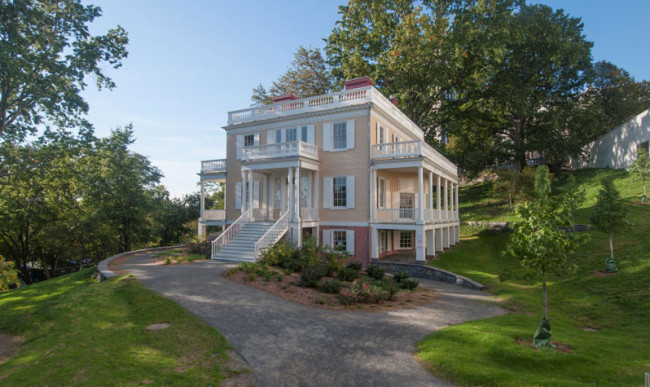What's the right etiquette when your neighbor is a celebrity?

The Dakota has been home to--and rejected--a number of A-listers.
New Yorkers pride themselves on remaining unruffled in the face of incidents most others would find thrilling, including encounters with the rich and famous who call the city home. Brick contributor Dennis Golin, who has lived for several years in the same building as Hamilton creator Lin-Manuel Miranda, observes, "I think there's always an overwhelming sense when you're a New Yorker and you see a famous person that the nicest thing you can do for them is not acknowledge them."
No wonder, then, that the likes of Helen Mirren, Sir Ian McKellen, and Mariah Carey feel comfortable riding the subway here. Jay-Z himself once humbly explained who he was to a fellow passenger—who turned out to be artist Ellen Grossman, a celebrity of sorts in her own right—after taking the R train to his performance at the Barclays Center.
Still, it's one thing to share a subway car with a celebrity, and quite another to share real estate. While some manage to snag private homes, many others opt for apartments: According to NewYork.com, if you live in one of the city’s swankier buildings, there's a chance that you might run into someone like Gwyneth Paltrow, Yoko Ono, or Beyonce.
Rather than feel discomfort at having to share a lobby with ordinary folks, some celebrities have said they appreciate the sense of normalcy that being just one of many tenants in a building brings them. Law and Order: SVU’s Chris Meloni told the New York Times, for instance, that his Midtown West neighbors were sweet and appropriate around him, and “It was fun being the resident celebrity.”
But what if you’re one of the normal people in a building that comes with serious celebrity cred? Pretending not to notice a celebrity is one thing when you’re passing them on the street, another when you’re both waiting at the front desk to pick up a package.
“The most important thing, at the end of the day, is to remember that celebrities are just human beings,” says Leonard Steinberg, president of Compass. “They are exposed 24/7, so they crave privacy, and their homes can become sanctuaries, but also cages. Then the role of the neighbor becomes not to add misery to their lives.”
(No) party in White Plains, U.S.A.
Alaina Greenberg, for instance, wanted to avoid gushing when her new neighbor turned out to be Miley Cyrus. She was particularly caught off guard by the arrival of the pop star, because her building’s location isn’t an obvious draw for the glamourous: It’s north of the city in White Plains, NY.
“I wouldn’t have known it was her, but my dog walker told me that she was in the elevator with Miley. I didn’t believe her until we Twitter-stalked her and noticed the finishes of our building in her selfies,” Greenberg says.
It turned out that Cyrus was shooting a movie in the nearby town of Valhalla; Greenberg notes that she could have chosen a more upmarket property to stay in while filming, but seemed to want to live like a regular person and attract as little attention to herself as possible.
“Once the word spread, there were a lot of people kind of whispering about it, but we also wanted to play it cool so we wouldn't alienate her,” Greenberg says. “She was there for about two months and was very normal and friendly.”
Greenberg finally got a chance to chat with the musician when they ended up in the elevator together when she was bringing a pizza up to her apartment for a gathering. “She said, ‘Oh, that pizza smells so good,’ so I invited her to come hang out with us,” Greenberg says. “She said, ‘I wish I could,’ and she got out.”
While she didn’t get to party with Miley Cyrus, Greenberg can rest assured that she handled the situation gracefully. “I think some celebrities are a little perturbed by how many people view them as otherworldly. They want to be treated like human beings. A friendly greeting doesn’t hurt, as long as it isn't a gushy one,” Steinberg says.
The apartment building where (celebrity-ogling) doesn't happen
Dennis Golin took the same tack after his neighbor, Lin-Manuel Miranda, went from the successful creator of In the Heights to a mega-star after the debut of Hamilton at the Public Theater. When his building's doorman pulled him aside to show him the musical's opening song, Golin was blown away. "That was the beginning of the halo effect around him. The times after that I saw him, he seemed very aware that everyone else knew who he was," Golin says.
Golin had considered approaching the composer and performer multiple times about his love of In the Heights, but they ended up chatting about something far more mundane: getting a grill for their building. "It was a very neighborly conversation," Golin says. "They want to know you can interact with them as a person and not just some famous guy."
Consider your nonchalant behavior a "thank you" for the cachet a famous person can lend your building: Steinberg notes that celebrities often come with built-in perks like improved safety (if they have their own security detail) and, for owners, potential appreciation of their home. "They add a bit of glamor and make the building famous to a certain point,” he says. “Everyone buttons up a little more and takes more pride in the building.”
On the other hand, if paparazzi get wind of your resident celebrity, you might have to fight your way through a sea of photographers—or crazed fans—when you exit the building. Golin points out the importance of home being a sanctuary from eager fans and probing reporters: "I can only imagine the kind of sheer terror that would happen if someone leaked our address to the press," he says.
And it seems that not all stars are as down to earth as Miley Cyrus: New York magazine reports that Sean Connery's neighbors in a Manhattan townhouse called the former James Bond a "bully" and a "rude, foul-mouthed, fat old man." On the Upper West Side, meanwhile, a light in Tracy Morgan's massive aquarium malfunctioned and started a fire in the building.
The possibility of drama has been disincentive enough for a number of the city’s co-op boards, reports the New York Observer: Barbra Streisand was turned down when she applied for a unit at 927 Fifth Avenue due to concerns over parties, while Madonna was rejected by the board at both the San Remo and the Dakota.
More typical, though, is that everyone in the building—celebs included—proceed as they normally would. "With the other neighbors, there's always little whispers," Golin says, "but nobody has the balls to write Lin a note asking for tickets or anything."
You Might Also Like































